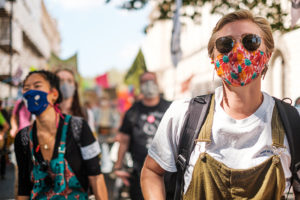Centering Youth Engagement: A Conversation with a Young Teen Changemaker
 Photo by Ehimetalor Akhere Unuabona on Unsplash
Photo by Ehimetalor Akhere Unuabona on Unsplash This interview has been condensed for length and clarity.
In the midst of a global pandemic and an ever-changing political and social climate, all eyes are on the future of our youth. Luckily, high school students in Virginia are rising to the challenge.
Several teens recently teamed up with state legislators to pass legislation in both chambers that would grant students an excused absence to participate in a day-long civic or political event. In the current General Assembly session, HB1940 passed the House and the bill is currently pending in the Senate. The effort was led by teens on both sides of the aisle and garnered local and national media attention in recent weeks.
I spoke with Adrian Klaits, Vice Chair of the Virginia Young Democrats Teen Caucus and a student at Marshall High School in Fairfax County, Virginia. (A representative with the Teenage Republican Federation of Virginia was unable to meet with me.)
Izzy Oldfield: How long have you been involved with the Virginia Young Democrats Teen Caucus and the party system on a local level in general?
Adrian Klaits: So, I got started just a year ago during my freshman year [of high school], after I started a Student Government Association campaign. Matthew Savage, who later was elected Chair of the Virginia Young Democrats Teen Caucus, had seen one of my campaign ads and invited me to a George Marshall High School Democrats club meeting. After that, Savage invited me to the Virginia Young Democrats Annual Convention where I ran for Vice Chair of the Teen Caucus, which is how I got involved in democratic politics and politics as a whole. Although, I have been politically minded for quite a while.
Oldfield: What inspires you to be involved in politics and work for change?
Klaits: Just seeing the world around me and witnessing injustices, I wanted to make changes. I have some faith in our political system, knowing that it can help people and is made for the people. So, I know that that is where we can make a difference and I think this bill shows just that.
As a young person, I think that we are underrepresented. There are many ways that we can make a difference, which I learned early on. Coming from abroad [Klaits lived in Egypt, Tajikistan, and Israel] and many countries where democracy was not a given, I gained a new respect and became more grateful for the system we have in place. and the system that lets my voice be heard and allows me to create a change politically for people like myself. So, I think that is what motivated me the most to get involved in politics.
Oldfield: How did you seek to educate your elected representatives and the public about the issue? Did you receive any pushback or a feeling you were not being taken seriously? What are some of the problems you faced?
Klaits: I have to say that many of our representatives were so respectful. I must give credit to everybody who helped us along the way and motivated us, including Delegate Sam Rasoul and Senator Jennifer McClellan, who sponsored our bill and took it up almost right from the start.
In terms of getting the word out, we used social media and other platforms to amplify our voices and the voices of teens, as well as different lobbying tactics. We teamed up with the Republicans [the Teenage Republican Federation of Virginia] to make this a bi-partisan effort and show Virginians that bipartisanship still lives in our state, even when Democrats have the majority.
Oldfield: What advice would you give about how to effectively work with those of a different political identity? What was your experience working with your counterparts: the Teenage Republican Federation of Virginia?
Klaits: I think that through our relationship with the Teen Republicans we realized how much we have in common. Even though we might not agree on some things, we can agree on things like civic engagement. I will admit I had some reservations at first but, as I got to know them, it became much easier to communicate. As for advice, just have a conversation with people who don’t agree with you and you might find yourself surprised.
Oldfield: The American Humanist Association Center for Education developed the “Ten Commitments”, including service and participation. What role do you think students can play in bettering our society by getting involved?
Klaits: I encourage all students to get involved in volunteering, even if it is not politically. But getting involved politically is especially important. There are a lot of support systems there to help you. I just want everyone out there to know that you can get involved in any issue you care about and you can make a difference.
Oldfield: What do you see as the next steps and priorities for increasing youth participation in civics and making their voices heard? Where do you see opportunities for future legislation in the current climate, both at the Virginia state level and federal level?
Klaits: In this past election, we certainly saw how making it easier to vote had a huge impact on youth turnout. Virginia had the second-highest youth turnout. Only Georgia had a higher turnout than we did. I think that the civic engagement bill that we have championed is going to start allowing kids to explore the political system and their interests.
Another bill that we worked with the Republicans on is a bill that would allow teens to pre-register at 16 years old. I think that bill has a lot of potential.
Young people’s issues are everybody’s issues, and I think that listening to young people’s experiences is important.
